Based primarily in the college town of Marquette, Michigan, the Excels went on to become the most successful band to emerge from the Upper Peninsula. During the group’s six-year run, they recorded five excellent singles that were produced by the legendary Ollie McLaughlin and released on his Carla Records label out of Detroit. Their recordings were distributed nationally by a subsidiary of Atlantic Records; and although none of the band’s 45’s made the Billboard Hot 100, several were regional hits in Michigan and also charted in other areas around the country. Featuring impressive group vocals, the Excels were also one of the most popular live bands on the teen night club circuit in Michigan, and the group opened for some of the biggest names in the music business during their storied career.
Born in Ishpeming, lead singer Clark Sullivan grew up in Republic, one of the many mining towns that dotted the Upper Peninsula of Michigan. Republic had a large iron mine, and Sullivan’s father was an iron worker. In 1956, the Republic Mine transitioned from an underground mine to an open pit operation, creating 800 new jobs and resulting in the moving of several sections of the town about three miles to the south. When the mine closed in 1981, however, it took most of the jobs in Republic and dropped the population down from nearly 2,000, when Sullivan was growing up, to a little over 500 today. 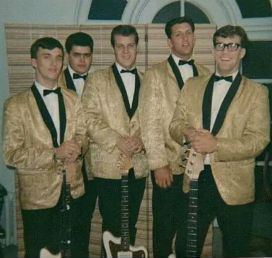 Excels (L to R) Terry Quirk, Ken Forrest, Clark Sullivan, Steve Contardi, Carl Holm
Excels (L to R) Terry Quirk, Ken Forrest, Clark Sullivan, Steve Contardi, Carl Holm
Elvis Presley keyed Sullivan’s interest in rock and roll, especially seeing him perform on the Ed Sullivan Show in 1956 and early 1957. He first became interested in playing guitar when he was a freshman at Republic High School. His friend Linn Campbell played, and it wasn’t long before Sullivan got his first guitar. It was purchased at Violetta’s Music Store in Negaunee, Michigan, a Sears Silvertone – a gift from his parents for earning good grades in school. The following year, however, he graduated to a Fender Stratocaster.
Music was part of the Sullivan household. His mother played guitar as did his uncle. They taught him a few things; but Sullivan credits Richard Jyhla, a Republic resident who was a few years older, for being his mentor and teaching him to be a proficient guitarist. It blossomed from there with Sullivan basically learning by ear, picking up chords and listening to records with Campbell while trying to figure out what the guitarists were playing. Sullivan was an avid record buyer (his first 45 rpm was “Peggy Sue” by Buddy Holly) and says: “I used to drive my mother crazy playing them over and over while trying to learn parts.” 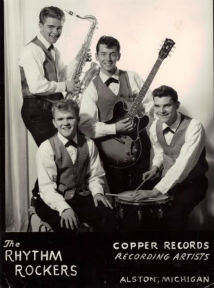
During high school, Sullivan became friends with a steel worker and musician named Dickie Patana who was employed at the Republic Mine. Patana was in a band called the Rhythm Rockers; and although most bands in the area had one singer doing the vocals, the Rhythm Rockers featured three and four-part harmonies. Led by brothers Dickie and Johnny Patana, the band had formed in 1958 in the tiny Copper Country community of Alston. The Rhythm Rockers went on to release two singles on their own Copper label. Sullivan had always gravitated towards harmonies; but when he first heard the Rhythm Rockers, it was like a door opening, and he knew immediately that he wanted to do something in the same vein.
Sullivan and Campbell formed their first band, The Legends, while still in high school. They picked up drummer Fran Manti from nearby Ishpeming, and they played a couple of dances for the Republic Youth Center during their junior and senior years.
The band that evolved into the Excels came together in the summer of 1963, shortly after Sullivan graduated from high school and the Legends had split up. He had driven to Jim Boerner’s Music Store in Marquette to take a guitar lesson from Dick Manning, an excellent guitar player and Ventures fan. Manning had already written two instrumentals that his band, The Marauders, had recorded for a self-released 45 rpm the year before.
Dick Manning, who was enrolled at Northern Michigan University in Marquette, had driven to the lesson from his hometown of Iron River with Carl Holm, the bass player in his new band The Magnetics. Holm, the group's youngest member, was still attending Iron River High School. Iron River, with a population of around 4,000, was a mining community with several underground mines for extracting ore.
Carl Holm’s father worked as a yard foreman for a lumber company in Iron River, and the family didn’t have a television until 1959. This, and the fact that both of his parents played guitar, spurred Holm's interest in learning how to play the instrument. After taking guitar lessons for a couple of years in Iron River, Holm settled on the bass, primarily because there weren’t many bass players around at that time. Holm’s father constructed the bass guitar that he used in the Magnetics.
The Magnetics had been practicing in the garage of the car repair shop in Iron River owned by Dick Manning’s father, along with local drummer John Zielinski and a part-time singer named Dave Vasser. The band needed a permanent vocalist, however, and both Holm and Manning thought that Clark Sullivan might be the missing ingredient after meeting him at Boerner’s Music Store.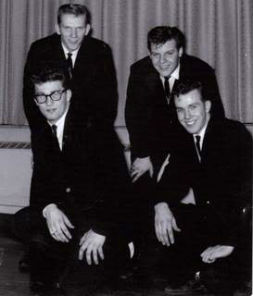 Magnetics/Excels 1963 (top) Dick Manning, Clark Sullivan (bottom) Carl Holm, John Zielinski
Magnetics/Excels 1963 (top) Dick Manning, Clark Sullivan (bottom) Carl Holm, John Zielinski
Sullivan was invited to jam with Holm, Manning, and Zielinski in Iron River; and Holm remembers that he made quite an impression when he showed up at the Manning garage driving his dad’s red Impala convertible with a white top. They set up their equipment in the garage and it all fell into place.
The band played several gigs that summer and also changed their name. Carl Holm remembers that he and John Zielinski were driving down Fourth Street in Iron River discussing possible new band names now that Sullivan was a permanent member and they had settled on a new musical direction. They pulled up behind a ’63 Ford Galaxy GT 500 XL at a stop light, and Zielinski suggested the new moniker after seeing XL emblazoned in chrome on the back of the vehicle.
Now officially billing themselves as the Excels, the band underwent some significant lineup changes in the fall. John Zielinski had been enrolled at Northern Michigan University since the fall of 1961 and was a music education major. He left to play in his father's locally successful polka band. Zielinski was replaced on drums by Steve Contardi who was also attending NMU. Dick Manning also left the group and was replaced by Terry Quirk, a fellow student at Northern Michigan University. Carl Holm said this of Quirk: “When Terry joined us, he brought his musical expertise, a Fender guitar, a saxophone, his falsetto, and an ability to harmonize.”
Terry Quirk grew up in Stambaugh, a small community near Iron River. His father and most of his extended family were employed in the mining industry. He claims it was a great place to grow up, and he was involved in several team sports as well as hunting and fishing. Quirk attended Stambaugh High School with his friend Steve Contardi; and the pair were big fans of Buddy Holly, Elvis Presley, and the Everly Brothers.
Quirk did some songwriting on guitar in high school but, at that time, he had developed a fondness for the country’s emerging folk scene centered around the popular Kingston Trio and Peter, Paul & Mary. He formed a trio of his own with friends and they did a few acoustic performances at school assemblies, but nothing professionally. 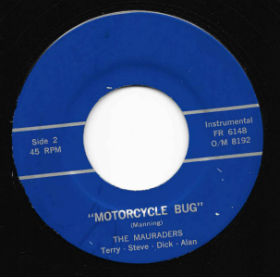
While still in high school, he and drummer Steve Contardi joined up with guitarist Dick Manning and another guitar player from Caspian, Michigan, to form a band called the Mauraders. Contardi and Quirk had gone to school together since 3rd grade; and Steve, whose father also worked in the iron mines, had started playing drums in the school band during his 5th grade year. Dick Manning was a big fan of the Ventures and composed two instrumentals, “Dreamy” and “Motorcycle Bug”, that they recorded at the WIKB radio station in downtown Iron River.
Terry Quirk’s mother, Vera, was the driving force behind arranging for the masters to be sent to a plant in Ohio where 200 copies were pressed into a 45 rpm single. The band took the record to several U.P. radio stations and got some airplay in what, in hindsight, was a tentative first step on the road to a succesful recording career with the Excels.
Because the band did not have a manager, Contardi became the unofficial booking agent for the Excels. He was an organizer; and he drew on his experience as a quarterback at Stambaugh High to do a task that the other guys in the band did not want to be bothered with. Contardi was happy to do the job, however, and it provided him with a foundation for the business career that he would pursue following his years in the Excels. 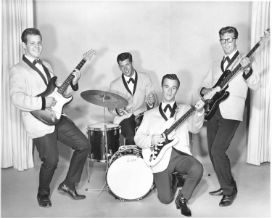 (L to R) Clark Sullivan, Steve Contardi, Terry Quirk, Carl Holm
(L to R) Clark Sullivan, Steve Contardi, Terry Quirk, Carl Holm
According to Clark Sullivan, the first gig that Contardi booked was at the Hideaway Bar in Aurora, Wisconsin, located near the state line just south of Iron Mountain, Michigan. They had not started classes yet and only had six or seven songs in their repertoire. The band had to extend the songs to get through the gig, but they went over well and were invited back.
The Excels initially drove band members and equipment in cars to their gigs – band in the front and amplifiers in the back seats. They were having fun and didn’t even think of using a trailer at the time, despite the tedium of trying to fit everything in the cars before and after gigs. They eventually graduated to a U-Haul trailer that Contardi pulled with his 4-door Oldsmobile sedan.
The final piece in the puzzle for the revamped Excels was finding a keyboard player. Terry Quirk met Ken Forrest in Spooner Hall at NMU. They were both music majors and lived in dorm rooms just down the hall from each other. Quirk and Forrest became great friends, and when they weren’t studying, they could be found playing music together. Forrest was invited to jam with the other Excels and the combination clicked right away. Forrest immediately went out and bought a Wurlitzer reeded portable piano, and the classic Excels’ lineup was now in place.
Ken Forrest was the only Excel with no Upper Peninsula connections. He grew up in both Riverview and Taylor, Michigan, downriver commu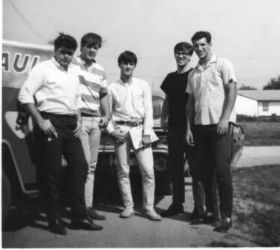 (L to R) K. Forrest, C. Sullivan, T. Quirk, C. Holm, S. Contardinities south of Detroit. His father was an auto mechanic and his mother was a homemaker with a great love of music that she passed on to her oldest son. Forrest started taking accordion lessons at the age of five and became deeply involved in the school music programs in both Riverview and Taylor.
(L to R) K. Forrest, C. Sullivan, T. Quirk, C. Holm, S. Contardinities south of Detroit. His father was an auto mechanic and his mother was a homemaker with a great love of music that she passed on to her oldest son. Forrest started taking accordion lessons at the age of five and became deeply involved in the school music programs in both Riverview and Taylor.
Despite being a rock and roll fan, Forrest’s first experience playing live music came when he was invited to join a local country and western band called the Rhythm-Aires while he was still in junior high. When he got into high school, he started playing accordion with a group called the Montclairs that performed mostly standards along with some rock and roll at weddings and debutante parties. After graduating, Forrest enrolled at NMU and majored in music education. Despite the nine to ten-hour drive from Taylor to Marquette, NMU’s lower cost was the determining factor in selecting the U.P. college.
On campus, the Excels rehearsed in the music rooms in the college’s Music Department or outside when the weather was nice. The Excels’ jam sessions eventually became a big deal on the NMU campus and even gained the support of the college dean. Word of mouth from the kids on campus was very helpful in getting gigs for the band around the state. The students talked up the band at places they went in their hometowns which in turn led to a lot of work for the Excels, including gigs in Northern Michigan at important teen spots like the Tanz Haus in Acme, Sugarloaf Mountain - north of Traverse City and Club Ponytail in Harbor Springs. The band also had a regular gig at a nightclub/bar in Iron Mountain called Joey Jaff’s. The gig lasted over a year, and it became an important testing ground for the Excels and a place where the band could work on new material.
The parents of the Excels were very supportive of the band as long as they stayed in school. They encouraged their sons to get their degrees so that they would have a backup plan in case their dreams for the band didn’t work out. Steve Contardi described Vera Quirk as a “go-getter in a good way”. She could see possibilities for the Excels and pushed and encouraged the band every step of the way. In addition, Contardi’s parents could always be counted on to provide a vehicle if the band needed transportation; while Holm’s parents made their home available for rehearsals in Iron River and Sullivan’s parents did the same in their home in Republic. 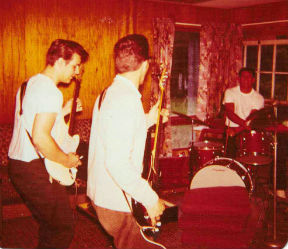 Sullivan, Holm, and Contardi rehearsing
Sullivan, Holm, and Contardi rehearsing
As the band’s reputation grew, the Excels began renting armories around the U.P. in places like Marquette, Iron Mountain, Escanaba, and Iron River to host their own dances. Sullivan recalled that the band could rent an armory for as little as $35 and hire a couple of security people. The band’s parents would pitch in by taking charge of admissions at the door and running the concession stand. The band packed the armories, and they made a considerable profit at each of the dances.
By the summer of 1963, the Beach Boys had emerged as one of the country’s important new bands with their combination of guitars and group harmonies on hits like their recent two-sided smash, “Surfer Girl” and “Little Deuce Coup”. The Beach Boys' songs celebrated girls, fun in the sun, cars, and surfing; and they quickly became the primary inspiration for the Excels.
The band first started doing some original songs in 1964; but emulating the Beach Boys’ look, sound, and vocal harmonies was an important part of their appeal. Although Clark Sullivan was the band’s lead singer, Terry Quirk did Brian Wilson’s falsetto parts. They covered many Beach Boys’ hits: “Surfin’ Safari”, “In My Room”, “Fun, Fun, Fun”, “Help Me Rhonda”, “Surfin’ U.S.A.”, “California Girls”, “Don’t Worry Baby” and more. Not many groups in the U.P. could do three and four-part harmonies, so it helped make the Excels unique among local and regional bands. They also covered songs from the 4 Seasons and the Association – music that helped them stand out. 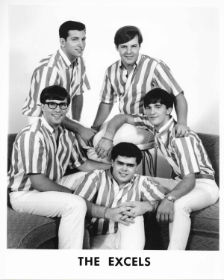 (Top) Contardi, Sullivan (Bottom) Holm, Forrest, Quirk
(Top) Contardi, Sullivan (Bottom) Holm, Forrest, Quirk
Although the Excels had been very successful covering the hits of the day, they realized that in order to become a viable group and obtain a recording contract, they needed to write original material. Although it was usually Sullivan or Quirk that brought the song ideas to the band, the finished product was always very much a group effort with Holm, Contardi, and Forrest all making important contributions.
The summer of 1965 would prove to be very important for the Excels. The band decided to drive to Detroit in an attempt to get a recording contract, expand their audience, and to keep their career moving forward. They left right after Carl Holm’s high school graduation, and he remembered that their first stop on their trip south was a Saturday morning audition at the Teen Chalet in Gaylord. The venue was run by Dan Lewis III who used an advisory group of high school students to help him evaluate bands for his club. Holm recalled that after they set up, the first song they performed was the Beach Boys’ recent hit “Help Me Rhonda”; and they knew by the students’ reactions that they had the job even before the song was finished!
With some original songs in hand, the Excels first stop in Detroit was at Hitsville U.S.A. on West Grand Boulevard. Although Motown wasn’t recording groups like the Excels at that time, the band got to meet Diana Ross, who happened to be there that day, and toured Motown’s studio and offices. Terry Quirk recalled that it was Smokey Robinson who suggested that they should go see Ollie McLaughlin. 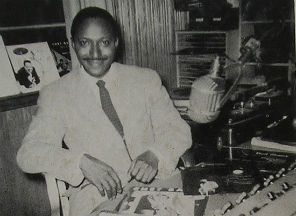 Ollie McLaughlin
Ollie McLaughlin
Memories differ as to whether McLaughlin was mixing down a record at United Sound Studios on Second Avenue or at the Golden World Studio on West Davison. Ollie McLaughlin was a black DJ and record producer from Ann Arbor. One of his early claims to fame was recommending Del Shannon to a Detroit management team, resulting in Shannon signing with Big Top Records and recording his signature hit, “Runaway”. McLaughlin had also discovered Barbara Lewis and produced her first single on his own Karen Records. He then helped her get a recording contract with Atlantic Records where she had a # 3 hit with “Hello Stranger” and was climbing the charts in the summer of ’65 with “Baby I’m Yours”.
Clark Sullivan said that the band didn’t know anything about McLaughlin at that first meeting. Terry Quirk recalled that they played him some songs, and that he liked their material, especially Sullivan’s lead vocals. McLaughlin suggested that they record a demo of some of their original songs, and he would see what he could do for the band.
The entire band stayed in the basement of the Forrest family home in Taylor that summer. Ken’s parents loved having the band there and treated them like family. Mrs. Forrest cooked and did laundry for everyone in the group while they kick-started their recording career. The Excels recorded a demo of Quirk’s “It Isn’t So” and Sullivan’s “Run Girl Run” on a little two-track tape machine and sent it to Ollie McLaughlin.
McLaughlin liked both songs on the demo and invited the band to United Sound Studios to record them for, what was hoped to be, their first single. The “It Isn’t So” and “Run Girl Run” 45 rpm wasn’t released that summer, however, as neither the band nor McLaughlin were completely happy with the results.
Undeterred, the Excels went back to Marquette and composed two new songs: Sullivan’s “Gonna Make You Mine, Girl” and Quirk’s “Goodbye Poor Boy”. The band was much more comfortable their second time in the recording studio with McLaughlin, and the two songs were released on Ollie’s new Carla Records label in 1966. McLaughlin used his connections with Atlantic Records to set up a distribution deal with Atco, one of its subsidiaries, and Billboard magazine selected the single as one of the predicted hits on its Top 60 chart. 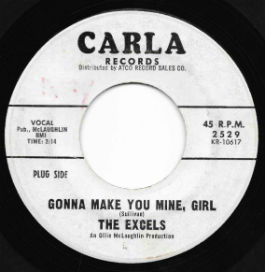
It was an exciting time for the Excels. “Gonna Make You Mine, Girl” was a big regional hit in Michigan, reaching # 1 on WSAM’s Super Sound Survey in Saginaw, but it did not chart nationally. It’s possible that the release on Carla, an R&B label, might have worked against the band since DJs around the country associated the label and Ollie McLaughlin’s recent productions, Deon Jackson’s “Love Makes The World Go Round” and the Capitol’s “Cool Jerk”, with a different style of music than that of the Excels.
The success of “Gonna Make You Mine, Girl” helped the Excels break out in mid-Michigan. The record was a hit on radio stations throughout the area. The band became close to WKNX DJs Dick Fabian and Bob Dyer in Saginaw who heavily promoted their records. The Excels played at Roll-Air in Bay City several times, and also at the Blue Light in Midland. They became a particular favorite of Frank Patrick at Daniel’s Den in Saginaw. He took the band under his wing and had them playing at the venue every couple of weeks as well as at his other teen clubs, including opening for Jimmy Clanton at the Daniel’s Den in Houghton Lake. Patrick wanted to manage the Excels and have them record with him, but the band wouldn’t consider leaving Ollie McLaughlin.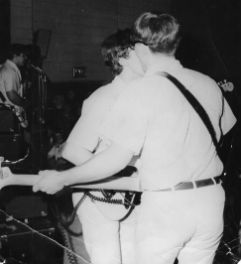 Excels at Daniel's Den
Excels at Daniel's Den
The Excels were featured in one of the weekly Saginaw News columns written by Deb and Jo, the newspaper’s intrepid teen reporters who covered the music beat at Saginaw’s Daniel’s Den and the Y A Go-Go. Titled Excels Boast ‘Style Of Our Own’, the article gives a glimpse of the band through the eyes of two young female music lovers: “The Excels are an all American group and often play songs originally sung by such famed names as the Beach Boys, Beatles, Herman’s Hermits, and the Dave Clark Five. These usually are rearranged by the group so as to create a ‘style of our own’”.
Deb and Jo went to describe the band: “The five blokes stood on stage and continuously peered down at the crowd, which when hearing the first bold chords of the group’s tough sound, surged to the front of the stage. The Excels stand behind twanging guitars, a humming organ, and a set of black sparkle drums and are clad in red and white surfer shirts and white pegged Levi’s. All wear penny loafers with the exception of Terry – who prefers to go about in bare feet, a habit since the beginning of summer. In he near future they will be going to the recording studio to cut some discs written by the group. If they sound as boss on the records as they do on stage, we are sure the discs wil be well worth buying."
The Excels’ second Carla single was released near the fall of 1966. The a-side was a Sullivan/Quirk composition called “I Wanna Be Free”. The record’s b-side, Too Much Too Soon”, is interesting primarily because Jerry Wexler’s daughter wrote the lyrics. Wexler was a co-director of Atlantic Records and had produced and promoted some of the great R&B recordings done at the label. Clark Sullivan was in New York with Ollie McLaughlin, and they went to see Wexler and Ahmet Ertegun, one of Atlantic’s founders. Wexler told them that his 14-year-old daughter, Lisa, wrote lyrics; and Sullivan offered to have the band put them to music.
The next time Ollie was in New York, he picked up the lyrics for “Too Much Too Soon” and brought them back to Michigan. Both Wexler and his daughter were happy with the music the Excels put together with her lyrics. Lisa Wexler even sent Clark a letter expressing her pleasure with the results. Issued as Carla # 2534, Billboard predicted “I Wanna Be Free” would enter the Hot 100, but it didn’t catch fire and failed to chart nationally. 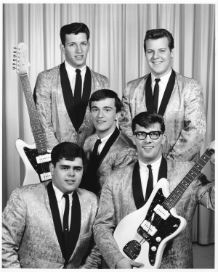
The records and their energetic live performances made the Excels a popular attraction all over the state of Michigan; but the busy schedule and constant traveling had taken a toll on Carl Holm, who was the only Excel not enrolled at NMU. Holm had been an excellent math and science student in high school and had earned a scholarship to Michigan Tech, located in the town of Houghton in the Keweenaw Peninsula. It was a long drive just to get to Marquette let alone all the other band gigs, and the travel had begun to take its toll on Holm’s grades. Faced with possibly losing his scholarship, and with the draft and the Vietnam War looming, Holm decided to leave the Excels.
The band offered Holm’s spot to Howard Ylinen, a multi-instrumentalist who had been playing guitar in a local Marquette band called the Rogues. Although the Rogues had not made any recordings, the band made a strong impression wherever they played. They drove to performances in a used hearse with ‘Rogues’ painted on the side, toting their Hammond B3 organ in a burgundy trailer that matched the burgundy interior of the silver Cadillac convertible that the rest of the band traveled in. The Rogues would then take the stage in their identical burgundy sport coats, complete with matching dickies as accents.
Ylinen’s close friend, Ed Rogers, also played in the Rogues. They had been friends since grade school and, like Terry Quirk, had formed a folk group called the Trade Winds that played for some church groups and other small gatherings. Rogers usually played the bongos at the little hootenannies, but sometimes he had access to a stand-up bass and that got him started on the instrument. 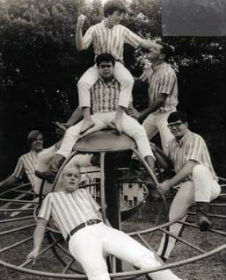 (Clockwise from top) Terry Quirk, Steve Contardi, Ed Rogers, Howard Ylinen, Clark Sullivan, Ken Forrest
(Clockwise from top) Terry Quirk, Steve Contardi, Ed Rogers, Howard Ylinen, Clark Sullivan, Ken Forrest
Howard Ylinen would not join the Excels unless Rogers was included; and as a result, both were invited into the band, making it a six-man group. This lineup only lasted a short time, however, because Ken Forrest was drafted, and Ylinen took over the keyboard duties in the Excels.
Forrest received his draft notice while he was still attending NMU and received his induction notice in the mail shortly after he had gotten married. He joined the Army in 1967, and Forrest was granted some options through the testing he did during basic training. Because of his musical background, he ended up serving his time in both the 3rd and the 8th Army bands. He did go overseas, but spent his 13 months in South Korea rather than South Vietnam. Forrest was promoted to the rank of sergeant before being honorably discharged in 1969.
The Excels went through yet another change when Steve Contardi left the band in June of 1967. Contardi got married and moved to Manitowoc, Wisconsin, where he would spend the next seven years pursuing his teaching career. Clark Sullivan took over the job of setting up gigs, but by that time the Excels were known all over the state and they no longer had to search for work.
Contardi was replaced on drums by Garry Stockero, who played in a band out of Crystal Falls called the Stormers. Stockero had been playing drums since the age of five and the Stormers came together while all of the members were still in high school. The Excels had seen Stockero play when the Stormers had opened for them at a show at the Iron River Armory.
Stockero, who was also the the Stormers' lead singer, was quite a bit younger than the other Excels. In order to join the Excels, he had to quit his football team during his senior year at Crystal Falls High School, where he was the starting quarterback, because they were booked to play every Friday and Saturday night. During an interview for this story Stockero stated that both his coach and his parents understood his decision, but that having to leave school early every Friday in order to to make it to downstate gigs resulted in several arguments with his high school principal.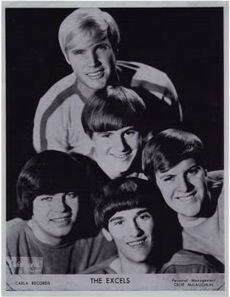 (Clockwise from top) Howard Ylinen, Garry Stockero, Clark Sullivan, Terry Quirk, Ed Rogers
(Clockwise from top) Howard Ylinen, Garry Stockero, Clark Sullivan, Terry Quirk, Ed Rogers
With their new drummer on board, the Excels scheduled some gigs outside of Michigan in Wisconsin, Ohio, Illinois, and Indiana. They also did a couple of television shows, appearing on Detroit’s Swinging Time and the Upbeat program in Cleveland. Because the Excels had records out that were getting airplay, the TV shows contacted Ollie who then arranged for the band to show up on the scheduled dates. Stockero recalled that the studios were much smaller than they looked on TV and that the young dancers were very close to them as they lip-synched their songs.
The Excels lineup of Sullivan, Quirk, Ylinen, Rogers, and Stockero recorded the next single in the summer of 1967. McLaughlin took the band to New York City to record “California On My Mind” and “The Arrival Of Mary” at the famed Columbia Studios where Frank Sinatra had recorded in the past. It was the first time that the Excels had worked with horns and strings. Garry Stockero was impressed that Felix Cavaliere of the Young Rascals, who had just enjoyed a # 1 hit with "Groovin'" on Atlantic Records, attended their session. Ed Rogers recalled how difficult it was doing the vocals, and that the instruments on both songs were played by studio musicians rather than by the Excels. McLaughlin had arranged for rooms for the band next to Central Park and, all in all, it was a very heady experience for a bunch of young guys from the Upper Peninsula.
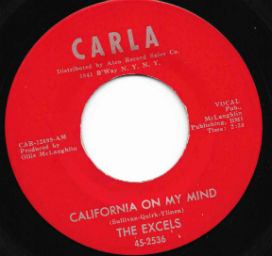
The single was released on Carla in the fall of 1967 around the same time that Clark Sullivan started his nine-week student teaching assignment in Negaunee, Michigan. There was some discussion at this jucture about the Excels joining one of the Atlantic labels, since Atco was already distributing their records. The Atlantic labels were having quite a bit of success at this time with a number of white acts including the Young Rascals, the Buffalo Springfield, the Bee Gees, and Cream.
Ollie McLaughlin wanted to keep the band on Carla, however, and continue to develop his own label. The Excels trusted McLaughlin and stayed on Carla, although releasing their record on an Atlantic label might have garnered more DJ airplay than a single on a small Detroit label. Despite the 30-piece string and horn section and the New York studio, neither “California On My Mind” nor “The Arrival Of Mary” made the Billboard charts.
Clark Sullivan had started a full-time job in the fall of 1968 at Flint Beecher High School teaching American history and art, and he had begun to find it extremely difficult to play every weekend. In order to keep things going, the rest of the band moved to cities in the Lower Peninsula except for Ed Rogers who still had classes at Northern Michigan University. Stockero recalled that it became increasing difficult to rehease and, since they were basically a covers band, stay current with the latest hit songs.
Sullivan recalled that he would sometimes have to leave immediately after school on Friday and drive to Traverse City to play at the Tanz Haus and then drive back the same night; and then be off to Grand Rapids the next night. Stockero claimed that they would play Friday night and then often travel to the Saturday gig and try to convince the owners to let them in early so that they could use the time to rehearse new material. It all became too hard to handle for Sullivan, and he was looking to leave the Excels at that point. He had gotten married earlier in 1968, and the school work he had to deal with as a teacher just added to the difficulty of keeping it going.
“Little Innocent Girl” was released in 1968, and it was the first song recorded by the Excels that was completely composed outside the band. The song, which was penned by Michigan songwriters Richard "Popcorn" Wylie and Tony Hester, was written with the Excels in mind. It was recorded at Motown's famed Studio B at Hitsville U.S.A. in Detroit with some studio musicians pitching in, including Funk Brother Bob Babbitt on bass. Although everyone in the band thought it was going to be their breakthrough hit, “Little Innocent Girl” did not chart nationally. It did receive a lot of airplay in Michigan, however, and reached # 2 in Saginaw on the WKNX Big Ten Survey. 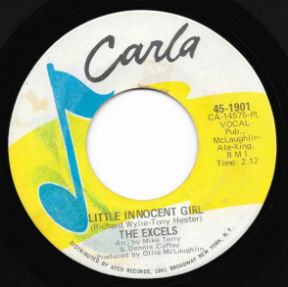
According to Terry Quirk, by 1968 there also seemed to be a little bit of a disconnect between the rest of the band and McLaughlin and Sullivan. Quirk felt that McLaughlin’s image for the Excels was more focused on Beach Boys-styled pop songs that focused on Sullivan’s voice as the lead singer; while Quirk, Ylinen, Rogers, and Stockero were moving in a direction more aligned with West Coast bands like the Mamas and the Papas, the Byrds, and Jefferson Airplane. Sullivan was not interested in that musical approach, so his parting from the Excels was mutually agreed upon and friendly.
Ollie McLaughlin wanted Sullivan to keep recording music in the vein of the Excels’ previous releases. After leaving the band, he began his solo career in the spring of 1969 with a single produced in New York by McLaughlin. “Let Me See Those Lights Again” and “I Can’t Get Away With It” were both written by Sullivan and Jack Strongman, a friend of the singer from Ishpeming, and released on the Romac label. 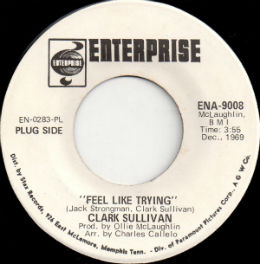
A second single, “Feel Like Trying”, also written by Sullivan and Strongman, was released later in 1969. Backed with “Leave Me Alone”, the 45 rpm was issued on the Enterprise label and distributed by Stax Records. Sullivan said that while he was doing a vocal overdub on “Feel Like Trying” at the Atlantic Studios in New York, he met the renowned songwriting and production team of Jeff Barry and Ellie Greenwich. They had come into the studio when Sullivan was overdubbing and were impressed with both the song and his vocals. Barry and Greenwich had recently produced Neil Diamond’s first ten hits on the Bang label and asked Sullivan if he wanted to sign with them; but Sullivan didn’t want to leave McLaughlin and declined the offer.
Sullivan’s final solo single, “Reaching for A Rainbow” backed with a re-release of “Leave Me Alone” was issued in 1970. Despite a good deal of airplay in Michigan and appearances at a number of record hops in the Detroit area, Sullivan did not really establish himself as a solo artist. 1970 also saw the release of “It Isn’t So” and “Run Girl Run”, the first two songs the Excels recorded with Ollie McLaughlin back in 1965. It was one of the final singles released on the Carla label.
After Sullivan left the band, the Excels were basically over. In the aftermath, things did not go all that well for Quirk, Ylinen, Rogers and Stockero. In 1969, looking for a record deal, they added guitarist John Heric from a U.P. band called the Ravelles. After headlining an outdoor show at Roll-Air in Bay City, they were invited to a meeting with a businessman from Bay City named Bill Kehoe and his company Delta Promotions. Members of the Excels had probably first come in contact with Kehoe on August 18, 1966, when they played the Band Canyon in Bay City, the teen dance club that Kehoe owned and operated.
Kehoe and another Delta representative pitched all kinds of ideas to the band but, most of all, they wanted a band who who could reproduce the harmonies to go on the road and impersonate the Zombies. In Terry Quirk's words they were, "naive and stupid and bought Kehoe's proposal hook, line, and sinker." As a result, they became one of two bands, the other contained two future members of ZZ Top, who went on the road posing as the Zombies from England.
The British Invasion band of “She’s Not There” fame was in demand again in 1969. “Time Of The Season” had been released as a single in the United States a year after the Zombies had broken up, and it had become a surprise hit. Kehoe claimed that he copyrighted the 'Zombies' name in an attempt to make it legal for his bands to tour, but it was certainly not ethical to deceive concert organizers and ticket buyers who thought they were getting the original artists. Kehoe also put other bands on the road posing as the Animals and Archies before his scheme was exposed by two articles in Rolling Stone magazine; and he was forced to close down his operation after being served with a host of lawsuits. 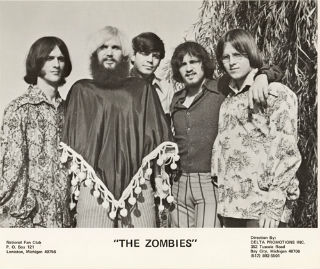 Excels as "The Zombies" (L to R) Terry Quirk, Howard Ylinen, Ed Rogers, John Heric, Garry Stockero
Excels as "The Zombies" (L to R) Terry Quirk, Howard Ylinen, Ed Rogers, John Heric, Garry Stockero
The band split up after the Zombies fiasco. Terry Quirk became disillusioned with the music business and quit playing for three years. After moving with his family to Colorado in 1973, he formed a band with his wife and brother called Quirk. They played ski resorts in the western United States from Santa Fe to Jackson Hole and did some recording in both Nashville and Los Angeles before calling it quits in 1976.
In 1971, Clark Sullivan invited Ylinen, Rogers and Stockero to join him in a band he had formed called Liberty. They played at various nightclubs in the Flint area and served as the house band at the Shore Acres Golf Club at Lake Fenton for seven years. It worked well because Sullivan lived in the Flint area and the other three lived in Lansing which was just 45 minutes away. Liberty recorded a single, “Girl, You Better Wake Up”, that was produced by Ollie McLaughlin and released on the BASF label.
After Ylinen and Rogers left the group, Sullivan and Stockero formed a trio with a pianist from Lake Fenton High School and, calling themeselves Liberty, performed oldies at small clubs and weddings until 1983.
The Excels accomplished a great deal in the years that they were together, and the seven former members of the band that I interviewed for this biography had nothing but good things to say about each other, their time in the band, their fans, the venues in which they performed, and especially their mentor and producer Ollie McLaughlin who passed away in 1984.
Over the years, the Excels shared the stage with some of the biggest names in 1960’s rock and roll: the Beach Boys, Jay and the Americans, Little Anthony and the Imperials, Chubby Checker, the Newbeats, the Buckinghams, the Dave Clark Five, Sonny & Cher, the Association, Gary Lewis and the Playboys, Paul Revere and the Raiders, Bob Seger, the Turtles, the American Breed, Mitch Ryder and the Detroit Wheels, Rick Nelson, Brian Hyland, Freddy Cannon, Jimmy Clanton, Dickie Lee, the Barbarians, and Spanky and Our Gang.
Sadly, original guitarist Dick Manning passed away in early 2018; but many of the of the other members of the Excels are alive, and several still live in Michigan. Clark Sullivan is a retired teacher and successful artist who resides in Swartz Creek. Ken Forrest is a retired band instructor and lives in Petoskey. John Zielinski is a retired music instructor and administrator whose home is in Mackinaw City. Howard Ylinen retired as a teacher and lived in Mt. Morris until his passing in 2018. Carl Holm retired as director of Housing at NMU and resided in Marquette until his death in 2019.
Terry Quirk makes his home in Cameron, Montana, and is co-owner of Madison River Rentals. Ed Rogers retired from the real estate business and lives in Ormand Beach, Florida. Garry Stockero retired from a career in medical sales and currently resides in Florida. Steve Contardi lives in Cincinnati, Ohio, and has spent the past 42 years running his own business, a tennis, fitness, and swim club called the Club at Harper’s Point. Contardi credits his time in the Excels booking gigs and hotels, paying bills, dealing with performance contracts, renting vehicles, and all of the other experiences in the band giving him in his own words: “A hell of a business background.” 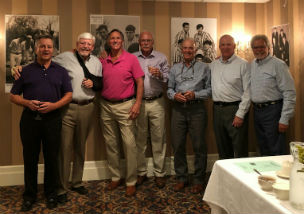 Excels Reunion (L to R) G. Stockero, E. Rogers, S. Contardi, C. Sullivan, T. Quirk, C. Holm, K. Forrest
Excels Reunion (L to R) G. Stockero, E. Rogers, S. Contardi, C. Sullivan, T. Quirk, C. Holm, K. Forrest
The Excels were named Historical Inductees to the Michigan Rock and Roll Legends Internet Hall of Fame in 2017. As a direct result of their induction, the Excels organized a band reunion in Marquette, Michigan, in July of 2018, that brought back together seven of the ten musicians who had played in the group. Carl Holm said of the reunion, "Although most of us hadn't seen each other or even been in touch for almost 50 years, we seemed to just pick up where we left off those many years ago."

